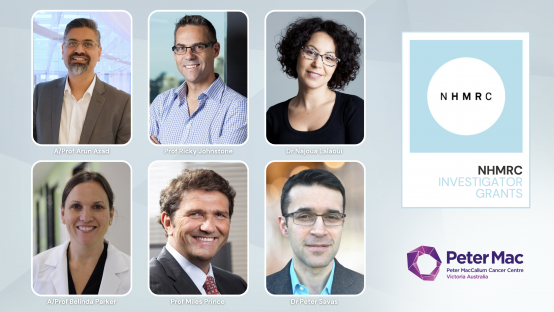News
NHMRC Grants Awarded to Six Peter Mac Researchers
13 October 2022
Every day Peter Mac researchers are trying to uncover a new way to diagnose, treat and eradicate cancer. To further research advances the National Health and Medical Research Council (NHMRC) granted Peter Mac over $9 million in funding through the Investigator Grant scheme. As the premier scientific funding body, NHMRC grants are notoriously difficult to secure and are highly competitive. We are delighted to announce the six successful Peter Mac researchers and their projects that will all help cancer patients in the future. The funded research projects include better and more effective treatments for advanced prostate cancer, novel new treatments for T-cell lymphoma and acute myeloid leukaemia as well a project that aims to reveal how and why a cancer develops. The project will lead to better ways to treat, detect and prevent breast cancer in young women. Other research projects include advances in the understanding of how we can inhibit cancer growth and survival through the manipulation of genes, how cell death and inflammation influence the body’s response to cancer and drawing on past patient samples to treat metastases with science-guided therapies. Peter Mac’s Executive Director of Cancer Research, Professor Ricky Johnstone, said “I am incredibly proud of the calibre of research we put forward for funding. “Peter Mac had one of the highest NHMRC success rate across the sector which speaks volumes to the talent we have at Peter Mac and our ability to cover the full spectrum of fundamental, clinical and health services research. “I extend my congratulations to the successful researchers and their proposals which all listed below.” An innovative clinical trial that uses radiopharmaceuticals to target a protein called PSMA (prostate-specific membrane antigen), which is found on most prostate cancer cells. The research will identify effective new strategies for targeting PSMA with radiopharmaceuticals and look at both the genomic and imaging data in treatment sensitive and resistant advanced prostate cancer. This data will help to understand why some patients respond better to PSMAradiopharmaceuticals than others and will lead to better and more effective treatments for advanced prostate cancer. This research project will determine how we can inhibit cancer cell growth and survival, and regulate how our immune system responds to cancer through the manipulation of the proteins and pathways that control the expression of genes. Cell death can occur during tissue damage but cell death is also a mechanism that allows old cells to be replaced by new cells. In some contexts, dying cells release inflammatory molecules that can be beneficial or detrimental to the body. This research proposal aims to study the complex interplay between cell death and inflammation. New treatment strategies can be identified when we understand the involvement of these processes in cancer and inflammatory diseases. Cancer spread remains very difficult to target therapeutically. Past research by Belinda has focussed on modelling the cellular interactions that occur during cell spread to develop markers that predict the effectiveness of existing therapies. The research also aims to uncover new biological targets for treating aggressive cancer types. The NHMRC funding will drive this research into the clinical setting by using unique humanised models and examining patient samples to enable science-guided therapies for cancer patients. The aim of this research is to improve outcomes for patients with blood cancers through immune and targeted therapy; specifically, T cell lymphoma (TCL) and acute myeloid leukaemia (AML), both of which are frequently incurable. The research project will enable us to undertake completely novel clinical trials using treatments other than chemotherapy which will include genetically engineered human immune cells called CAR T-cells specifically designed for treating TCL and AML. Breast cancer causes the highest number of disease related deaths in adult women under the age of 45. It is a difficult problem that is also becoming more common. To understand this disease better, we need a comprehensive and detailed approach. Using samples taken from real patients, this research will apply sophisticated technologies to reveal how a cancer develops. This may ultimately lead to better ways to treat, detect and prevent breast cancer in young women.

